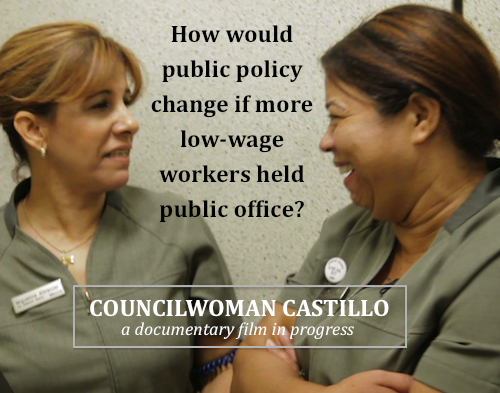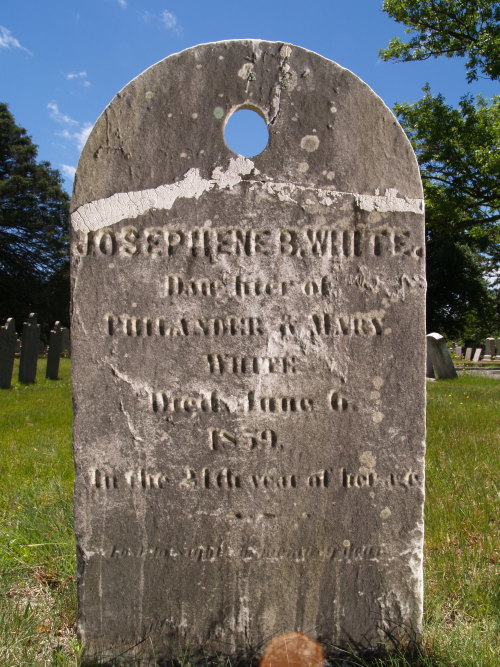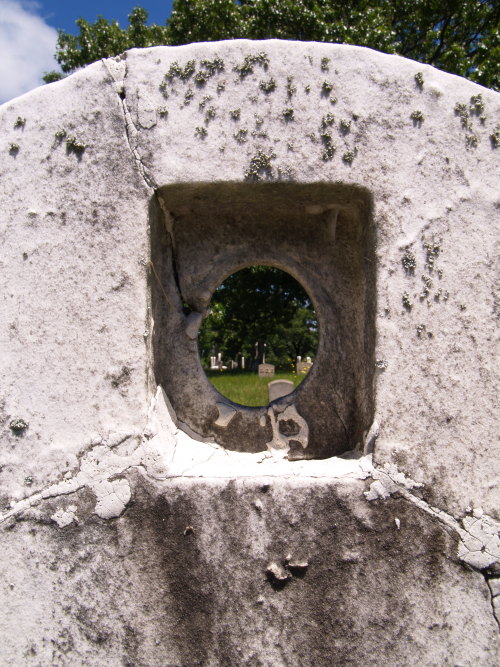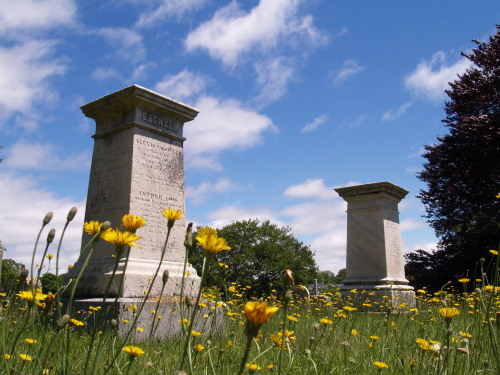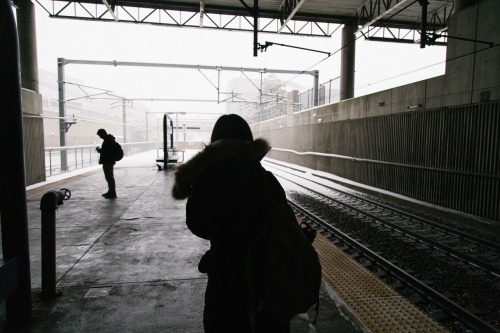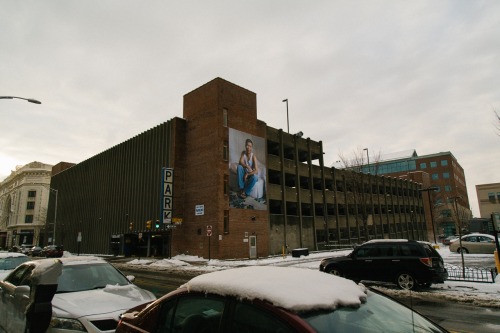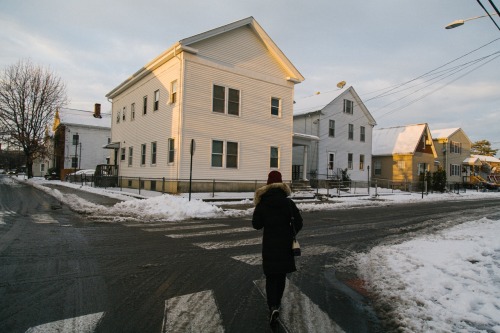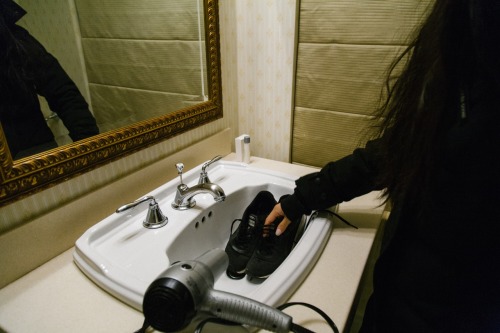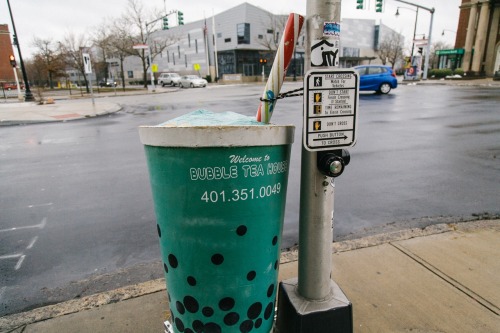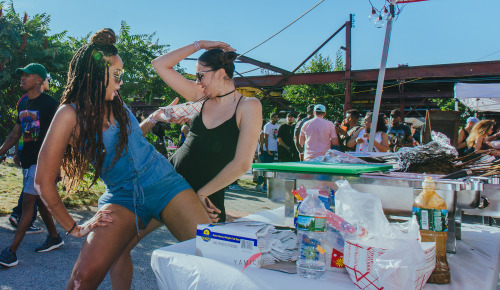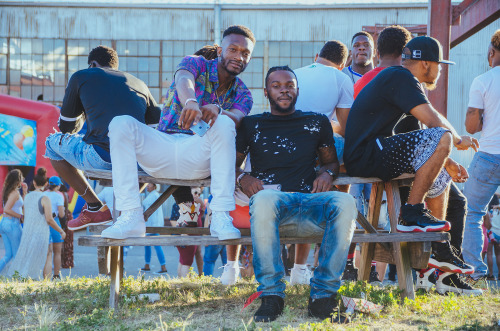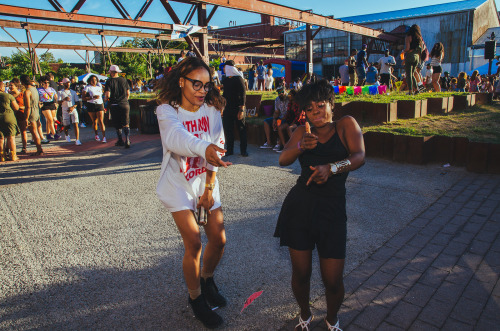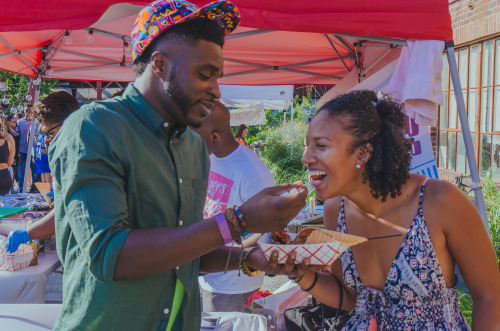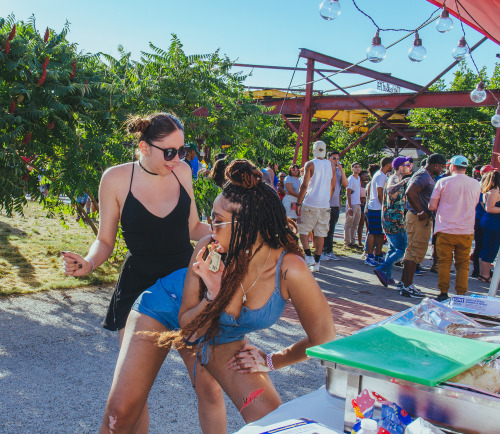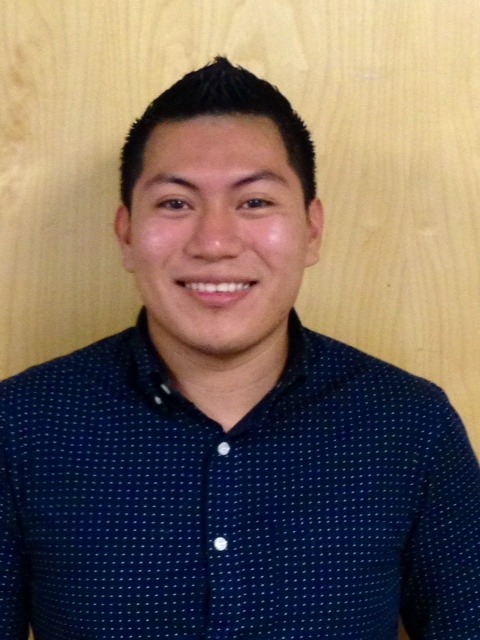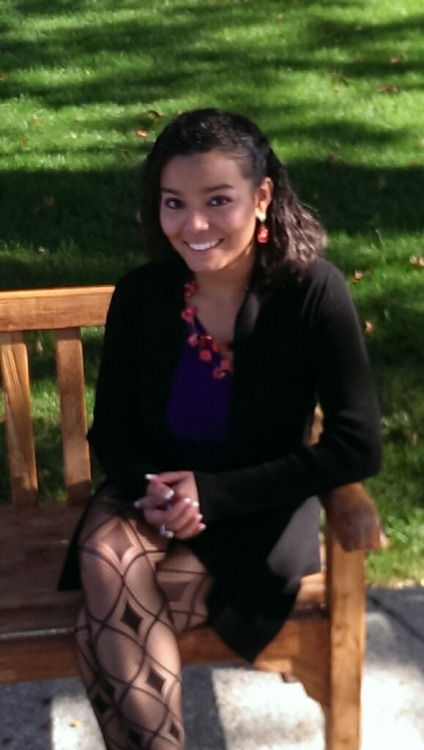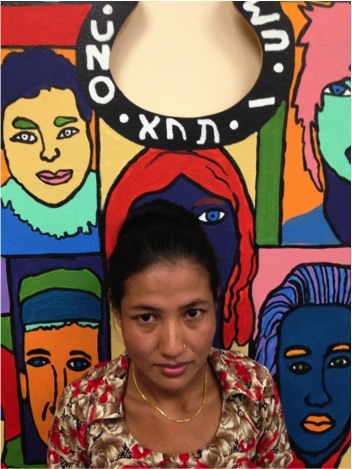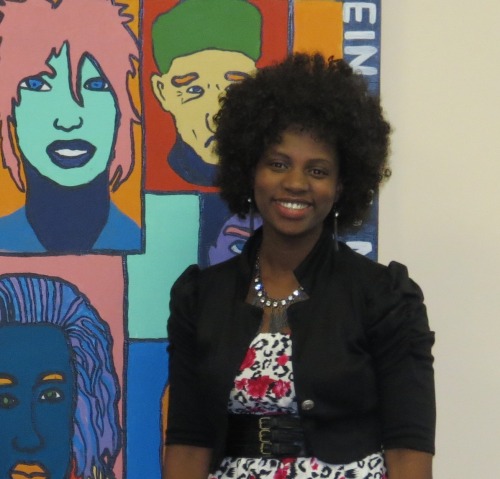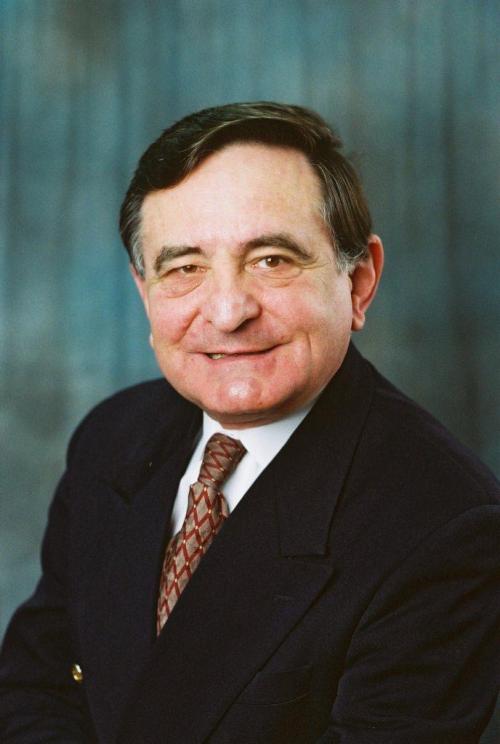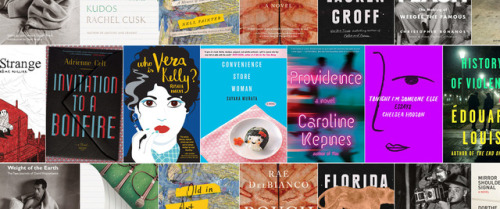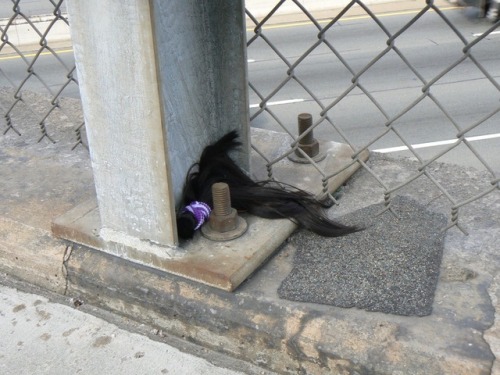#providence
I’m up to the third issue, but I just have to blabber on about the protagonist’s second dream, the one in which he’s on a train. All the hints and hooks and seemingly minor incidents in the story up to now feature in the dream, but at the same time, some of these allusions are obviously “premonitions”. I put “premonitions” in quotes because in Providence, time is kind of a permanent, motionless thing where every thing that happens sets up echoes in the past and the future. (It makes more sense in the actual graphic novel than in my words.)
The premonitions are unmistakably of the Holocaust, still twenty or so years into the protagonist’s future. Stating it flat out like that doesn’t begin to convey the growing atmosphere of dread, of foreboding. It’s still just disturbing little hints, but it chills me to the bone! It’s almost as if the premonitions reflect something approaching him that’s even worse, if possible, than the Nazi genocides.
I originally started reading the novel due to Gordon White’s praise of it. He described it as having a genuine magician’s understanding of time, and that each event thus sends echoes down through the past and the future. I’m beginning to see what he meant.
When was the last time you saw a great film about union workers fighting for good jobs? Here’s one:
http://www.kickstarter.com/projects/724829692/councilwoman-castillo
Post link
I will be tracking down and posting as many of these stones as I can find over the course of the summer. Within Rhode Island they appear about as often as the proverbial needle in the haystack.
Post link
As part of my larger “project” I am documenting what I believe to be the fusion of early photography and tombstones in Rhode Island. These two mediums (photography and gravestones) I believe speak the same language of memory and death.
This is the back of one such stone in Providence from 1859. Tomorrow, I will post the front.
Post link
Abdulkadir Faragab was born in Kismayo, Somalia in 1982. Growing up was tough for Abdulkadir, but he made the most of it. After graduating high school he began working as a mechanic, largely due to his life-long interest in cars. He also worked as construction worker and eventually started a family.
In his free time he enjoyed caring for his family and playing soccer with friends. However, turmoil erupted in the country and a civil war broke out. “The Somalia people started to just take what they needed. There was no order or somebody to tell them no.” Abdulkadir had to make a tough decision; he left his wife and children to pursue a better life in America. He understood that he needed to make money and support his family, ultimately giving his family a better life in the long run.
Abdulkadir first traveled by car and bus with a group of other refugees to Libya. Here, he spent some time in a refugee camp where life was difficult.
“People discriminated against people from my part of Africa. Sometimes, we would perform jobs and they would give us no money for it. It was a tough way to live. I worked for 12 hours a day and made only $20 dollars.”
In March 2013, after about a year in Libya, Abdulkadir was resettled to Rhode Island and immediately began seeking resources to personally advance so he could support his family back in Somalia.
“At first, I barely knew English and needed to learn how start a new life. I missed my family back home, but it was my responsibility to care of them, even if I would not see them for a while.”
He started to go to Dorcas International Institute of Rhode Island to learn English, make connections, and adjust to American culture. He admits that learning English has been a struggle thus far. “At first I had no idea what was going on; people were talking fast and no one could understand me. Otherwise, I am really starting to understand the language.”
Before coming to the United States, Abdulkadir had to learn of variety of different languages– Arabic and three native Somalian languages– to adjust to all the moving in Africa he did to find work during the war, so he considered mastering English as only a minor challenge. With help from Dorcas International Institute, Abdulkadir was able to find housing with three other refugees he worked with in Libya. He also began a job at a hotel in room service. Although he wasn’t working as he did in Somalia as a mechanic, Abdulkadir took the work to send some money back to his family.
Adjusting to American culture was also a challenge for Abdulkadir. “At first, when my English wasn’t so good, it was hard to ask people for help. Sometimes, if people didn’t understand me, they would just ignore me.”
Other than adjusting to the language barrier, Abdulkadir has slowly been integrating into American culture. He enjoys learning more about the English language and helps out other Somali and Arabic speaking refugees when they first arrive here.
He keeps some of his local traditions, however, and enjoys shopping at a local African market, God is Able African Market in Providence that sells foods and spices native to Somalia. Someday, Abdulkadir would like to also learn Spanish, just to expand his knowledge and communicate with Spanish-speakers in his community.
When asked what he was most proud of, Abdulkadir stated, “I’m feeling good. I’m happy that I was able to make it to Rhode Island and still support my family back home.” However, he keeps one goal on his mind at all times, which is to bring his family to Rhode Island.
“I know they would love it here. I always tell them Rhode Island is a great place. My kids can go to good schools, and I can finally spend time with the people I miss so much.”
Written and compiled by Zachary Brown and Niko Rufo
Post link
Ting Barnard was born in Vientiane, Laos and moved to the United States when she was one year old. Her family left Laos due to political issues and war strife between Cambodia and their homeland, braving a journey that wasn’t for the faint of heart.
After a gruesome boat trip to Thailand they were fortunate to survive, Ting and her family were brought to the United States as refugees, landing in Boston. A giving family sponsored them and provided assistance with food, clothing, and day trips for Ting and her three siblings. It was her beginnings in the United States that showed Ting the importance of helping others, which soon became her mission in life.
Upon arriving in Rhode Island, her new home, Ting felt alienated due to the differences between her and other kids. She and her family were unable to have “nice” and “fancy” things, but she was happy and healthy with the bare essentials.
Ting refused to let the bullies get in the way of her dreams. She earned a degree in Sociology and English at Boston University in 2002. Soon after, Ting was working her way up the corporate ladder in a prestigious hedge fund company and later for Lehman Brothers in New York City. After a trip with her husband, Ian, to her home country, she realized her fast paced lifestyle needed to change.
“We lived with no water, no electricity, and my husband and I loved every minute of it; it’s important to live a simple life. After this experience, I decided to come back to Rhode Island and settle down to be closer to family.”
Ting’s current lifestyle utilizes every minute of every day, but she wouldn’t have it any other way. She has a finance career in downtown Providence, works as a fashion designer for her own custom line, dedicates time to being a philanthropic leader, and, most importantly, focuses on her role as a mother and wife. As amazing as her accomplishments are, she is most proud of her daughter, Victory, her little “fashionista” at the age of four.
Ting’s inspiration comes from many role models, all of whom urge her to continue to be charitable and to stay humble. Among those, are Ting’s parents who taught her the importance of hard work and community service. Her father, Viengkhone, has been the president of the Laotian Association of Rhode Island for 5 years. Her mother, Tong, volunteers and provides services to women in Rhode Island, especially those struggling economically.
Ting’s mother-in-law and father-in-law also have had a significant impact on her success both professionally and personally. They have encouraged her to be the best she can be and the value of teamwork. The Barnard’s favorite saying is, “We are all in this together.” This is the motto she lives by and shares with her daughter.
“Growing up sleeping on the floor and worrying about where the next meal was coming from gave me an understanding that I never want anyone to live like that, and inspires my mission to give back. I even worked at a jewelry factory growing up, earning money for my family just to make ends meet. I want to teach my daughter the importance of helping others and hope that she continues the community outreach.”
Ting is a visionary leader and is actively involved in YearUp, Center for Southeast Asians Rhode Island, StyleWeek, Children’s Friend, Mayor’s Southeast Asian Council, Lincoln School Parent Association, and the Welcoming Rhode Island Advisory Committee. In the future Ting would like to assist with job creation, as she sees it as her mission to help the unemployed get back to work for the community to thrive.
“I want a thriving Rhode Island filled with innovative thinkers, a state fueled with ideas, passion, culture, heritage and unlimited opportunities for everyone. I wish for a level playing field for everyone, where one is not limited to his dreams because of financial situations. A state where one is welcomed to dream and to dream BIG.”
Ting unites the community in unsurpassed ways, always looking to better Rhode Island while staying true to her Laotian roots.
“As a Rhode Islander and a citizen of the United States, I feel an obligation to assist those that share this “journey to America for a better life” story. Initially, I felt the importance and almost the need for my family to assimilate into Western culture. But now, I understand how crucial it is for us to share our customs and traditions with those that are native to America. We live in a much different world where being one nationality or race is not the norm. We are indeed a melting pot of multicultural awesomeness with a myriad of languages, customs, traditions and food!”
Written and compiled by Lauren Mullins and Kristen Ferrucci
Post link
Victor Morente was born on January 17, 1990, in Zacualpa, Quiche, Guatemala. He grew up in an impoverished neighborhood, where the community suffered from lack of food and clean water. Victor remembers the people living in extreme poverty, in houses built of Adobe mud, with no cars.
Due to the civil war and genocide in Guatemala at the time, Victor’s mother fled the country and crossed over the border as an undocumented immigrant in 1994. She was forced to leave Victor behind with one of his aunts because he was too young to accompany her. At the age of six Victor finally embarked on his journey to the United States. He crossed The Rio Grande on a raft, traveled through Mexico, and walked the deserts of Texas. After finally reaching an airport in Texas he was able to take a plane to Providence, Rhode Island.
Growing up in a predominantly Hispanic neighborhood in the Southside of Providence with many other minorities, Victor felt welcomed. He was an excellent student, who put a lot of time and effort into his schoolwork. In high school however, Victor was told that his dream of going to college would not be possible because he was an undocumented immigrant. He became disillusioned and stopped doing his schoolwork.
Two years after graduating high school, Victor and his family finally received a phone call from their attorney who informed that they had a court date scheduled at the Boston Immigration Court based on their immigration application for asylum protection. When the court date finally came, his mother was extremely nervous, while Victor remained calm and confident.
After 16 years of waiting, Victor and his mother finally were granted legal permanent residency. He believes the struggle he went through from being an undocumented immigrant motivated him. “And that’s why I am even more driven now because for a long time they told me I shouldn’t even be here right now.” Victor was determined more than ever to pursue his dream of going to college and continue to work hard to become successful.
After making a trip back to Guatemala with his family last summer, Victor saw how Guatemalans struggled to put dinner on the table for their families and how the government was not protecting its citizens. This only motivated Victor further, because he saw where he came from and how privileged he is today to have the opportunities that he does in United States.
“If you have initiative, it doesn’t matter where you are from, you can definitely become successful.”
Victor attended the Community College of Rhode Island part time while he was undocumented, and then transferred to Rhode Island College after his legal situation was resolved. He is currently a senior at Rhode Island College where he is majoring in Political Science and Public Administration, while also minoring in International Nongovernmental Organizations. He is a member of the National Political Science Honor Society, also serves as the President of the Programming event board on campus, and is currently interning at the Rhode Island Attorney General’s office.
He hopes to attend law school with the goal of one day becoming an immigration lawyer. Just as he received assistance throughout his journey, he hopes to be able to help other immigrants toward their path to citizenship. It was for that reason that he also interned at Dorcas International Institute this past summer in the Feinstein Center for Citizenship & Immigration.
“I feel that if you get help from someone, it’s your duty to give even more back.”
Victor resides in Providence with his mother and brothers. He is a strong believer in the importance of recognizing the individual contributions of Rhode Islanders from all cultures and backgrounds, and that stories like his must be shared more often.
“I was so afraid of what people used to think about me, but why not tell them? In high school they always made jokes about going to your home country, and being a wetback, and I remember those jokes. For a long time it was shameful, but now there needs to be more stories about these things.”
Written and compiled by Evita Iiskola and Andrew Hopkins
Post link
Stephanie Alvarez was born in Cali, Colombia in 1994. When Stephanie was only six months old her parents uprooted their lives and headed to the United States. As cooks, her parents found jobs in Providence in the culinary field and struggled to offer their children a better life in the United States.
“Well like a lot of other people, they came for the search of better jobs, and a better place to raise a family. They chose [Rhode Island], I think, because they heard a lot about economic opportunities, and it was a small state and seemed like a good place to settle.”
Settling in Central Falls, Stephanie was raised with Colombian values infused in her life. Although she does not remember Colombia, she still identifies with Colombian culture, largely in part because of her mother’s influence. She was taught Spanish as her first language and is proud to be bilingual.
“Growing up in Rhode Island was great, but it was really hard. My first language of course was Spanish, my parents knew next to no English; so going to school was really tough without knowing English. I got made fun of a lot for my heritage, and as a child that really affected me.”
Stephanie is currently a student at the Community College of Rhode Island and hopes to transfer to Providence College to pursue her dream of becoming a pediatric surgeon.
When she is not in school or working full time as a Certified Nursing Assistant at Waterview Villa Nursing Home in East Providence, Stephanie is taking care of her two-year-old son, Christopher, whom she refers to as “the absolute joy in my life”. She is raising him to be bilingual; with a strong sense of Latino values that she believes played such a pivotal role in her life.
Stephanie hopes to one day be able to travel back to Colombia to see the rest of her family, especially her older brother. Her parents did not have the financial means to bring the entire family to the United States and had to make the hard decision to leave Stephanie’s older brother back in Colombia as the rest of the family went to Rhode Island.
Since Stephanie left Colombia at such an early age, she does not actually know her older sibling personally, but rather has a relationship with him through social media. This has a deep impact on Stephanie who wants nothing more than to have her family in its entirety together in the United States. “You know, we have been trying [to bring family members to the United States] for a really long time. It has been a long and tedious process, hopefully one day it will happen.”
Stephanie feels a special bond with other immigrants in Providence, regardless of their home country. She is proud to be an immigrant and loves that Providence fosters such an open environment to all foreign-born individuals. She hopes to see a continuation of this cohesiveness between the immigrants in Providence and is glad that she can be a part of it. Stephanie’s ultimate goal is to see a world in which immigrants are totally accepted for who they are.
“When you first come here to America, it’s going to be really hard. It’s still hard for my family. So I think if we all work harder, then we can be a more welcoming community.”
Stephanie hopes that one day equality with reign over prejudice. She wishes this not only for herself, but for her young son Christopher as well.
“As he is growing up, I just want him to have opportunities; opportunities to be who he wants to be, and [to] grow up in a safe environment. I don’t want him to be judged or stereotyped as different…I want a Rhode Island that will welcome him. That will be supportive of him. Not just for him, but for everyone. I don’t want him to be judged, or looked at differently. That’s the Rhode Island I want for him”.
Written and compiled by Melissa Keiser and Michael Finnerty
Post link
Komlan Soe was born in Toe Town, Liberia. At the age of three, a civil war broke out forcing Komlan and his family to flee to a refugee camp in Ivory Coast, where his family survived on little rice, cornmeal and flour distributed by UNHCR. At the age of seven, he started first grade at a school established by the United Nations High Commissioner for Refugees and other non-profit organizations. The school was in unfinished buildings and on under trees, where Komlan and other youngsters would sit and learn their basic Math and ABCs.
In 2002 when civil war erupted in Ivory Coast, Komlan and his family fled to another refugee camp in Ghana. While in the camp in Ghana, Komlan’s curiosity and passion for education grew stronger. Komlan took a high school entrance exam, and he came first out of 70 applicants. He later received a scholarship to a prestigious boarding school, where he was able to sit, for the first time, at comfortable desks and discovered a passion in international affairs.
With his father already settled in Rhode Island, Komlan and his family migrated to Rhode Island in November 2005 as refugees sponsored by Dorcas International Institute of Rhode Island.
It was a bittersweet family reunion because his two sisters and a brother remained in Ghana. His welcome into Rhode Island with a sign greeting him and his family was an experience he would never forget.
“It was… I’m finally in the United States. Yes that’s good. It was like a dream.”
As an immigrant, the transition of life in the United States was difficult. The first time Komlan saw snow, he was in disbelief. He was also not accustomed to the American sports, or the food, and did not understand why some people in his new community did not give up their seat to elders on the bus.
In 2008, Komlan began his studies at the Community College of Rhode Island after more than three years of delaying college in order to work and help his family financially. In 2010 he transferred to the University of Rhode Island (URI) where he became heavily involved in different activities while pursuing a dual degree in Political Science and Sociology. While at URI, Komlan worked as a Teaching Assistant and held down a full-time job. He graduated in May 2013; a dream he had finally achieved. “I am the first in my family to graduate from college.”
Komlan now works with the African Youth Development Initiative, which he co-founded to empower and engage African and African-American youths around issues such as violence, education, and African culture and history. He not only hopes to engage the youth in Rhode Island in the discussion of what is going on in their state, but also hopes to see more challenging education systems for those young students:
“One day you will be actively involved to bring about change. So the mobilization of young people and then challenging young people… challenging them to get involved is the most important thing I think I can take from that.”
His hope for immigrants is that they should no longer be viewed as victims, rather as survivors. As an immigrant, he saw the ways in which the civil wars affected his family and those he loves, but he says he is very glad he is in America.
“To be an American is to have a story,” says Komlan. He has spent years now getting comfortable sharing his story, and telling people about his past. Komlan believes it is important to remember where you come from, and that having pride in your roots is what makes America so great and unique. It is diverse with many different people, he says, yet everyone shares a common ideal – to make their lives better.
Komlan hopes to attend grad school at Harvard University or Columbia University to continue his passion for education. His biggest goal is to one day become a diplomat to speak, and have a voice for those who don’t. He has since been back to Ghana and Liberia and feels he is needed back in his native homeland, so he plans to help.
“An African proverb which I always refer to says, ‘You are… because we are.’ And that means everything that is done has to be done collectively. One person’s success is everyone’s success and people have to hold together”.
No matter what challenges face him, Komlan smiles and stays determined to get through it.
Written and compiled by Delia Egan and Joseph Thuillier
Post link
Passang Chauwan was born in the western half of Bhutan, but at the age of eight she moved to a refugee camp in Nepal where she remained for over 20 years, “In Nepal, we sat in a small house, and had a difficult life in camp.” In the refugee camp, she went to school because only single women were allowed to attend. “If women were married, they could not go to school; they had to stay with the children.”
After 20 years of living in the refugee camp in Nepal, Passang resettled as a refugee in the Unites States with her two daughters, husband and mother-in-law. The refugee resettlement process was not easy.
“It was different from when we left Bhutan to go to Nepal. The United States government had a process for refugees, which involved a form that took two years to get approved. Each family at the camp had different problems. The form asked why we left Bhutan to go to the United States and questions like that.”
On February 12, 2012, Passang left Nepal for the United States with her two daughters. “Yeah, we were worried about leaving our friends in the camp, but we knew we had family in the United States.” The trip from Nepal to the U.S. lasted two days and Passang was only able to bring a suitcase and a couple dresses. Through sponsorship from Dorcas International Institute of Rhode Island she settled into a Nepali community in South Providence.
“I am happy to reunite with my husband’s family [who came to Providence first]. I am happy I was able to come here to Providence. Some cases you don’t get any choices where you go so they did me a favor by letting me meet up with my husband’s family. We have a nice community now.”
Passang and her husband live in Providence, Rhode Island, with their twelve and seven year old daughters. “The community is nice and the neighborhood is good.” Passang jokingly said the only part of Providence she could do without is the snow. “The only difficulty is the snow. In my country (Nepal) we don’t have snow, only the mountains do.”
Passang works at Falvey Linen Supply and is also taking English classes in the morning at Dorcas International Institute. She also works “part-time at another job.” In addition to working and taking English classes, Passang takes care of her husband, her children, and her mother-in-law. Both of her daughters are full time students and have grown accustomed to American culture. Passang hopes that they will still hold on to the traditions the Nepalese have practiced for generations.
Initially Passang was nervous if her children would fit in to American culture. She hoped that they would enjoy school and make friends. “The first day of school they were crying, but after a week they were happy.” During her first days in Rhode Island, Passang felt welcomed by other Nepali refugee families who had moved here previously. The Nepali community is tightly connected and helps support one another.
“Each weekend we go to a different house and get together and discuss and ask questions to each other what is difficult for us in the United States and we try to help everyone out in our community…If somebody passed away, then maybe we get together and discuss how much money we need to raise and donate to the family. Also, we talk about citizenship in the United States. Some have no driver’s license, no car, and that’s difficult in our community.”
Passang is very happy to be in the United States and feels blessed to be out of the refugee camp. “I was born in Bhutan, grew up in Nepal, and now I am in America today. Now I have a story like this, the refugee. I have the life.”
Although Passang is happy to be in the United States, she still said, “I miss my family all in Nepal.” Her family still in Nepal includes her mother, sister, and brother. Unfortunately Passang’s mother is constantly sick and struggles with health problems and remains in a refugee camp. “My mom is always sick; she is in a Nepali refugee camp. My sister and my brother, everybody, is in the refugee camp, but they are all in the process [of coming here].”
Passang’s dream for the future is for her daughters to continue school and attend college. She helps her daughters with their school work and also provides financially for the family. “My big mission is for my two daughters. I will work long, and hard, and pay for good knowledge if they want, I will help them. That’s why I came to the United States”
Written and compiled by Alex Napoli, Matt McDermott and Briana Di Prizio
Post link
Teddi Jallow grew up in a small village in The Gambia. Although education opportunities for women in The Gambia were slim, she walked four miles to and from school every day, in the hot or cold weather.
In her last year of high school, her husband of two months, Omar Bah, faced many threats because of his position as a journalist. A dictator ruled The Gambia and through his power its citizens lacked freedom of speech. Those who went against the dictator’s views faced serious threats and danger including death. Even in the face of this daunting imposition, her husband continued to pursue his career and due to his reporting Bah’s family began receiving threats.
“We don’t call it a war zone but it’s kind of like that. Because whatever you said, if you were opposed to him [the dictator], you were dead. They killed so many people there, and he was the guy who was out there writing whatever he saw.”
Because of the seriousness of the situation, Bah had no choice left but to flee the country. He spent his first year away in Ghana and then was relocated to Rhode Island as a refugee where he spent two more years before reuniting with Jallow. In June of 2009, Jallow began her journey to her new home. Her trip took a day and a half and three different flights: from The Gambia to Belgium, Belgium to Newark, and Newark to Rhode Island.
The decision to come to Rhode Island was out of their hands. However, it ended up being a perfect fit coming from one of the smallest countries in Africa to the smallest state in the United States. Upon arrival, Jallow was welcomed by Bah and some of his colleagues. The adjustment to her new environment posed some challenges that both Jallow and Bah had to overcome, such as getting used to transportation, housing, and new foods.
A memory that Jallow recalls from her first day in Rhode Island was her surprise to see all of the cars in the parking lot, thinking that they were all for sale. Bah had to explain that those were the cars that people drove around every day. This concept was new to her and after some hesitation she was able to recognize the fact that people didn’t walk to places as much as she was used to.
After having some time to adjust to this new way of life, Jallow began studying nursing at the University of Rhode Island during the week, while also working throughout the weekend and raising two young boys, Barry, 3, and Samba, 1 ½. Even with this busy schedule, she continues to look forward with a positive attitude. Jallow is inspired by the independence and motivation that she sees around her.
“You see these seventeen, sixteen year old girls that are working. Like, everyone here is working and independent. And everyone is going to school, so you see that is the life that everybody wants. Being able to be independent: go to school, go to work, be yourself. You don’t have to follow anybody to give you anything. You don’t have to be like ‘Oh you are a woman you have to stay in your house, take care of the children’. No that’s not the case. So you have all of these opportunities; you need to make use of them.”
Jallow understands the importance of education, especially since it wasn’t easy for her obtain in her home country. In Rhode Island, Jallow wants to improve the education system so that youth may see its value. She is also concerned about bullying in schools, regarding the lack of understanding that the children have of each other’s differences.
“Children are our country’s future. When they go to school, they are the [future] presidents, they are the [future] law makers, they are the [future] jobholders; they are everything for us. So if you educate kids to be better, I think that will make a big difference.”
In order to create a more welcoming environment, Jallow believes that it is important for immigrants and refugees not to be the recipients of sympathy.
“Incorporate them, let them be independent, let them be themselves, [help them] to be able to do things for themselves, because we have so many opportunities here.”
In light of all that Jallow and her family have faced, she continues to work hard to better her future and to teach her kids to take advantage of every opportunity presented to them.
Written and compiled by Katherine Cantillo and Hannah Sorila
Post link
Dominique Gregoire was born in France in a small village in the center of the country in 1948. As a child, Dominique enjoyed the time he spent vacationing on the farms in the countryside in Brittany. Some of Dominique’s best years were in Paris as a college student at Sciences Po and the Paris Faculty of Law where he enjoyed the culture that surrounded him. After finishing his studies in 1970, Dominique went to work as the Chief of Staff in Normandy where he helped develop the city center.
Soon after, Dominique met Donna, a woman from Providence, Rhode Island, and married her. After starting a family in France, it was decided that Dominique, Donna and their two daughters, Julia and Claudia, would make the journey to the United States where there were better job opportunities.
Upon arriving to Rhode Island in 1986, Dominique and his family stayed with his in-laws for a few months until they could sell their homes in France. Staying with family made the transition very smooth, and for the most part Dominique felt welcomed.
“There were some times that I was confronted with people that did not accept me. That was somewhat of a challenge.”
Dominique gained employment relatively quickly in Rhode Island. His first job was working for a modular home company that transported homes to people and set up the houses at the foundation. Dominique then worked for the Governor’s Office and later for the City of Providence.
Dominique is now retired from mortgage business and has been working on a project he calls the “Jewel of New England” which includes a place for pedestrians to walk freely, with tons of cafes around the downtown Providence area. He also has ideas that would increase transportation so that more people would visit downtown. Currently, Dominique is considering finding another job position in the non-profit sector, possibly in the education field.
Dominique believes that Rhode Island can be a great state if the people come together towards a common goal.
“The state of Rhode Island is beautiful. The coastline, the towns, and Newport. People are easy-going. There are a lot of people who have done a lot for the state and we ought to give them credit.
When thinking about the future Rhode Island Dominique wants for his children, he imagines “a place where they will have good professional opportunities and a place where they will be able to contribute to the community. A place where they will be able to raise their children, comfortably. And a place where it is fun to live is very important. An urban environment that is fun to be around where you have cultural opportunities and festivals.”
For the last 15 years, Dominique has been the president of the French Alliance of Providence, which offers language classes, lectures and concerts at their headquarters on Smith Street. The French Alliance allows Dominique to stay connected to his home country and language when he isn’t traveling to France.
A large part of Dominique’s life is his two daughters, Julia and Claudia. He has taught them certain values so that they have grown up to be the women they are today.
“You have to be ambitious, have goals, and be educated. We insisted on education with our children and they’ve gotten a good education, but also the values of family, love, affection and taking care of each other. That’s what we tried to do and so far it has been working.
Although Dominique enjoys living in the United States, he is concerned about inequality, gun violence, and the amount of people who are incarcerated. He believes that the United States has a lot of potential to fix these problems, but it will take time and effort.
“To a certain extent, I really love this country and I think it has enormous potential. We have people with imagination and creativity and we have the best colleges. People create things every day. But we still have a long way to regain the soul of this country.”
Written and compiled by Jacqueline Shepard and Jake Scearbo
Post link
From memoirs to graphic novels, short stories, and autofiction, our staff and contributors recommend 16 books to read this June.
Post link
HOMILY for Feast of St Patrick
Jer 1:4-9; Ps 116; Acts 13:46-49; Luke 10:1-12. 17-20

There’s much celebration in the borough of Camden and beyond today. We’ve been in need of some good news, and today news broke of the release of someone after six years in captivity. I’m speaking, of course, about the news that Nazanin Ratcliffe, a charity worker, has been released from jail in Iran at last. We thank God for her release and for this good news. However, this is very fitting today on St Patrick’s day, a day of great jubilation for millions around the world. For St Patrick, too, had been in captivity, enslaved after having a pirate raid on his part of Roman Britain, and he was taken to Ireland where he worked as a shepherd for six years of enslaved labour.
And yet, in God’s providence, these six years of hardship, which Patrick hated, were instrumental in the coming of the Gospel of salvation to the Irish people, the people who had enslaved him. Patrick’s father was a deacon, and his grandfather might have been a Christian priest too, but at the time when he was captured, aged 16, Patrick was not an active believer himself. In this respect, he’s a fitting patron for many adolescents born into Catholic families! But during those six years of captivity in Ireland, Patrick had a conversion experience: as a shepherd he had time to pray, to repent of his sins and ask God for forgiveness, and eventually, he was converted to a living faith in Christ. So, we pray today, through St Patrick’s example and intercession, for that same grace to be given to all of us; to those who have a lukewarm faith, a dead faith, a merely cultural faith or familial faith but not a living personal faith in Jesus Christ. May we too be brought to a deeper conversion, a deeper friendship with Christ, a living relationship with God.
May we rejoice at the Good News of our liberation, not so much from a prison in Iran, or from slavery in the fields of Ireland, but something far worse: slavery to sin, addictions, passions, which lead to eternal death. We rejoice that Christ our Saviour has set us free from this! As St Luke says: “The Lord has sent me to bring the good news to the poor, to proclaim liberty to captives.” St Patrick, having been a captive and a slave himself would have known the truth of this statement, literally, but he chose to return to Ireland after having studied and been ordained a priest, because he saw that the people in Ireland experienced an even deeper poverty and deprivation: they had not heard the Gospel, or they had rejected it. So St Patrick writes in his spiritual autobiography, “Never before did they know of God except to serve idols and unclean things. But now, they have become the people of the Lord, and are called children of God.”
So we rejoice today in that historic conversion of the Irish people thanks to the efforts of St Patrick. His years as a shepherd prepared him well to become a missionary shepherd in Ireland, a true pastor for the people of Ireland, and we pray today for many more to follow in his footsteps as true priests and bishops, willing to suffer for the sake of the Gospel and for the salvation of souls.
For hundreds of years, Irish missionaries have gone throughout the world, inspired by St Patrick’s example, to preach the Gospel to the ends of the earth. As a convert to Catholicism in Singapore, I knew the good example and steadfast faith of Irish nuns and Irish brothers who taught in our Catholic schools. They never lost their accents, their humour, and love for good craic, even though they lived all their adult lives in the Far East, many of them dying and being buried in Asia. May these wonderful Irish missionaries – many of whom are rejoicing in eternal life, I’m sure – pray for Ireland today, and for all the sons and daughters of St Patrick!
For now, it would appear, the time has come for the world to send missionaries back to Ireland; and to the Irish communities throughout the world; and to those who, like the youthful Patrick, do not have an active faith right now! In our time, Americans and Nigerians (who also have St Patrick as their national patron saint), for example, have been going to Ireland as lay missionaries and priests and religious, to remind the Irish people of their ancient faith. So too I find myself having come from Singapore to this place, in a sense, repaying the debt that I owe to Br Kevin Byrne, Br Oliver Rogers, Br Joseph Kiely, and all the other Irish-born De La Salle brothers who inspired me with their gentle faith and their firm teaching about the love of Christ. They converted me, during those six years I lived in Singapore, so you could say that, by God’s providence, because of St Patrick and his legacy, I now find myself standing here today as your parish priest.
Hence the best way we can celebrate and honour St Patrick today is by actively living and handing on the One True Faith, a strong faith in the Holy Trinity and in God’s providence and power, a faith that St Patrick expresses beautifully in his Lorica, or Breastplate invocation. Let us now pray with him:
“Christ with me, Christ before me, Christ behind me,
Christ in me, Christ beneath me, Christ above me,
Christ on my right, Christ on my left,
Christ when I lie down, Christ when I sit down,
Christ in the heart of every man who thinks of me,
Christ in the mouth of every man who speaks of me,
Christ in the eye that sees me,
Christ in the ear that hears me.
I arise today
Through a mighty strength, the invocation of the Trinity,
Through a belief in the Threeness,
Through a confession of the Oneness
Of the Creator of creation”
Amen.
HOMILY for the 7th Sunday per annum©
1 Samuel 26:2,7-9,11-13,22-23; Ps 102; 1 Cor 15:45-49; Luke 6:27-38

The newspapers carried an astonishing report on Friday of a man called Dr Adam Towler. One night in 2019, a teenager knocked on his door in Bristol, and when he opened it, he was pulled outside of his own home, and stabbed nine times. The man who did this did not have any previous acquaintance with Dr Towler, nor was there any apparent motivation for this unexpected act of violence. At the sentencing of his attacker last Friday, Adam Towler said to the man who nearly killed him: “I want to say that I am not upset or angry with you… I don’t think you owe me an apology or anything, but I do want you to know what it’s like for me.” And he told the Today programme on Radio 4 that “The fact we’re here talking today, I got lucky –I’m living a quite normal life, a comfortable life”, and he expressed a deep sympathy for his attacker who now has to spend the rest of his life (or at least twelve years) in prison.
I immediately thought of Adam Towler’s words when I read today’s Gospel: “Love your enemies, do good to those who hate you, bless those who curse you, pray for those who treat you badly… Treat others as you would like them to treat you.” These words are so familiar to us, but perhaps we sometimes think of them merely as an ideal, but one that is rarely seen in action. Many of them, I am sure, struggle to live as Christ teaches us today. Hence, when a newspaper reports words like Dr Towler’s, it makes me sit up and reflect because these actions are, as the judge said, “extraordinary”; Dr Towler, moreover, does not hint at any explicit Christian faith. But, as the judge said to Dr Towler, “Whether it is the effect of intellect, or faith, or kindness and understanding, I don’t know. If it is the consequence of intellect, I admire it. If it is the consequence of faith, I envy it.”
There is much to admire in this situation, but I am not envious of another’s faith. Envy, after all, is the vice of experiencing sorrow for the good that another receives or shows. No, one does not envy the faith of another, nor their extraordinarily good will, nor their act of forgiveness, compassion, and empathy. Rather, one desires to emulate him, or at least, one should do! For this is at the heart of today’s Gospel: we can do all these extraordinary things because we want to emulate God our Father! So Christ says: “Be compassionate as your Father is compassionate… love your enemies and do good, and lend without any hope of return… and you will be sons of the Most High.”
Indeed, Christ who is, by nature, the Son of the Most High God, shows us on the Cross how to regard one’s enemies: our compassionate God, the Son of God, makes excuses for sinners, he forgives, and he says, in effect, something like “I am not upset or angry with you… I don’t think you owe me an apology or anything”. In doing so, Jesus teaches us, who by grace are also sons of God, how we can respond to those who hate us and do ill. God gives us the grace to react with compassionate love, just as Jesus does, if we want to.
However, the problem I think is that most of us expect too little of God, too little of his grace, and certainly too little of ourselves. Perhaps we do not think we’re worthy to emulate God our Father and so we don’t really try. Or maybe we don’t think that we can actually be like Christ – we see only our own failings and weaknesses, but we don’t recognise the power of God given us in the Sacraments. “We’re not really cut out to be Saints”, people tell me but such talk, sadly, seems to despair of God’s power, God’s grace, God’s mercy which is only merciful because it moves us to change and improve and to become the sons and daughters of God that our Baptism calls us to be! The consequence of this is that the Gospel becomes just an ideal, a mythical story, but robbed of any power to radically change us and change our society. The consequence is that we remain in our sins, and will not allow God to draw near to help us and save us.
The example of Dr Adam Towler can, I think, awaken us to the possibilities. And lest anyone thinks that Dr Towler is (apparently) not a Christian, and so his actions only belie the power of secular altruism, or serve to prove that one doesn’t need God in order to be good or moral, I would ask anyone who thinks like this to pause a little. Pause and think, and look at this theologically. For it is simplistic and bad theology to think that God only helps Christians, or the virtuous, or those who are in his club. Rather, the compassion of Christ who died for all, and the incarnation of God who thus allies himself with every human being, shows that God’s grace is much more powerful and pervasive than the doctrines of religious tribalism would allow. Again, I think that if we expect too little of God’s grace, too little of God, then we would just say that Dr Towler’s extraordinary act of forgiveness was just a non-religious fluke. But I refuse to say so. Rather, I say with St Justin Martyr that the seeds of God’s goodness and reason are found throughout creation – God’s creation. And I say with St Cyril that the incarnate Word of God is active and present in every human person. And I say with St Thomas Aquinas that all good finds its origin and impulse and perfection in God. That is to say, no good is possible for anyone or anything at all were it not first caused and sustained by God. This is what a robust theology of God and divine causality looks like. And this is Catholicism.
So, we thank God that he moved Dr Towler to behave with such divine benevolence and empathy towards his attacker, in the hope that such compassion would move the attacker to repentance and to final salvation. For God, in his wisdom and providence, can and will use any one of us, not simply for our own good, but for the salvation of others. Again, a robust theology of Providence leads us to say that God is always in control, and he moves people, whether they are Christian or not, to do his will, always for a greater good that we do not see. In this case, I want to suggest, that Dr Towler’s example should chasten us Christians, give us cause for humility, and embolden us who are called by grace to be sons and daughters of the Most High God to behave more like our heavenly Father. In other words, Dr Towler challenges each of us to be more authentically Christian, and to emulate Christ more faithfully.
These, I think, are fitting lessons and reflections as Lent is soon upon us. How can I demand more of God, more of his grace, and so expect more for myself? Christ says today that “the amount you measure out is the amount you will be given back.” So, when we pray and ask for gifts from God, let us ask for a generous measure of God’s graces, that will change not our external circumstances but our interior being. For know this: God wants to make us Saints, he wants us to be his own beloved children, re-made in the image and likeness of Jesus Christ his Son.
Therefore Pope Benedict XVI said: “Man was created for greatness—for God himself; he was created to be filled by God. But his heart is too small for the greatness to which it is destined. It must be stretched… It is only by becoming children of God, that we can be with our common Father… When we pray properly we undergo a process of inner purification which opens us up to God and thus to our fellow human beings as well. In prayer we must learn what we can truly ask of God—what is worthy of God. We must learn that we cannot pray against others. We must learn that we cannot ask for the superficial and comfortable things that we desire at this moment… We must learn to purify our desires and our hopes… For prayer to develop this power of purification, it must on the one hand be something very personal, an encounter between my intimate self and God, the living God. On the other hand it must be constantly guided and enlightened by the great prayers of the Church and of the saints, by liturgical prayer, in which the Lord teaches us again and again how to pray properly.”
So, as Lent approaches, let us be ready to learn to pray better, to be purified in our hopes and desires, so that we desire holiness, desire closeness with God, desire to become more like the Lord who is compassion and love.
Honestly one of my favorite pictures ever taken. I was walking across a bridge over a highway when I discovered it. Rather than disturb it, I just took a picture. I still think about this from time to time. I wonder what happened.
Post link

